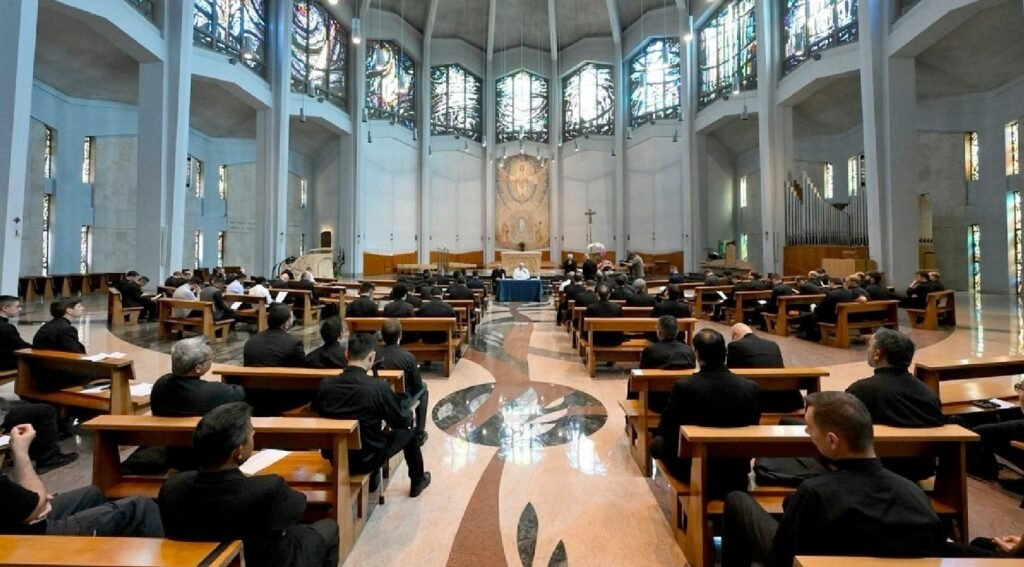(ZENIT News / Rome, 6 March 2024) – We frequently receive words that the Pope has said directly and publicly, words that others say the Pope has said, and words that he did not say but that are attributed to him (there are quite a lot of these words on WhatsApp).
When the Pope speaks publicly, he is not wrong. He said what he said and he takes responsibility for it. But in other cases, people say things that the Pope is said to have said, and that can cause problems. This week, it emerged that in part of a private conversation with the Italian bishops, the Pope had referred to gays in the seminary, using the word “homo,” which has a strong derogatory meaning in Italian.. ” The issue received so much attention that the Vatican’s press office had to issue an apology in the Pope’s name.
While this controversy was still not over, another one arose: one person said that during a meeting with young clergy from the Archdiocese of Rome, the Pope had exhorted them not to gossip, because “gossip is for women.” The absence of an apologetic press release in this second case attracted attention, but the important point lies elsewhere.
Is it lawful to make public what was said in private? When people meet in these types of situations, the language is more colloquial, and there is a sense of confidence that they need not be so careful when expressing their opinions. But this incident has revealed how, at least for the Pope, speaking frankly in an intimate setting among acquaintances can be problematic.
Besides these two news, other noteworthy news this week stood out. Announced on Monday, May 27, the resignation of the bishop of La Plata, Argentina’s second most important diocese, after only eight months in office. Bishop Gabriel Maestre was forced to resign by the Pope who appointed him. According to Argentine media, the background to this resignation was the fact that when Bishop Maestre was transferred from Mar del Plata to La Plata, he wanted to appoint a priest he trusted as his successor. This led to the subsequent resignation of two bishops appointed to Mar del Plata by Pope Francis. When Bishop Maestre’s resignation was announced, he gave his own version of the facts:
“As he does each month, the Pope entrusted his prayer intentions for the month of June to Catholics around the world. On this occasion, he asked them to pray for the situation of migrants fleeing war and famine, that they may be welcomed and find new opportunities in life.”
After finishing his 19-part catechesis series on the theme of vices and virtues, the Pope began a new catechesis series on Wednesday, May 29. From now on, the Pope will further reflect on the theme “The Spirit and the Bride – the Church is the bride, the Holy Spirit leads the People of God to an encounter with Jesus, our hope”. As not everyone may know, every Wednesday throughout the year, except July, the Pope holds a general audience in St. Peter’s Square. If it is too hot, too cold or too rainy, he holds a general audience in the Paul VI Hall, where thousands of people can see and hear the Pope. To take advantage of this opportunity, the Pope holds a catechesis every Wednesday. A catechesis series means setting aside several Wednesdays to further reflect on a theme.
One of the themes that the Pope will further consider, due to an inadvertent move by the Presidency of the Spanish Bishops, is the Sacred Heart of Jesus. In fact, Bishop Luis Arguello told reporters on Friday, May 31, that: pope I told him that I was about to publish an Apostolic Exhortation on the Sacred Heart of Jesus.This made him only the fourth pope to speak about the Christian faith.
Moreover, the Vatican ended May with good news: a European group (Moneyval) published a follow-up report on the Vatican’s anti-money laundering system, and the results were positive enough. And while a new ambassador (Argentina’s ambassador to the Vatican) arrives in Rome, another ambassador announces his resignation, after only two years as US ambassador to the Vatican: former Democratic congressman Joe Donnelly returns to the United States. It is likely that the Vatican will be without a US ambassador until after the election of the new president, that is, after November 2024.
A week in Rome ended with a beautiful gold brooch. Corpus Christi The procession took place in the city, from the Basilica of San Giovanni in Laterano to the Basilica of Santa Maria Maggiore. The Pope did not take part in the procession, but went directly to the Basilica, where he gave the Eucharistic blessing. In a homily shortly beforehand, the Pope explained the meaning of the procession and why it had been suspended for several years.
“This is also the meaning of the Eucharistic procession that we will soon take place. Starting from the altar, we will take the Lord to the houses of our city. We do not do this to pretend or boast about our faith, but to invite everyone to share in the Eucharistic bread, the new life that Jesus has given us. Let us take part in this procession in this spirit.”
Thank you for visiting our site’s content. If you would like to receive the ZENIT daily email newsletter, you can sign up for free using the link below.This link.


